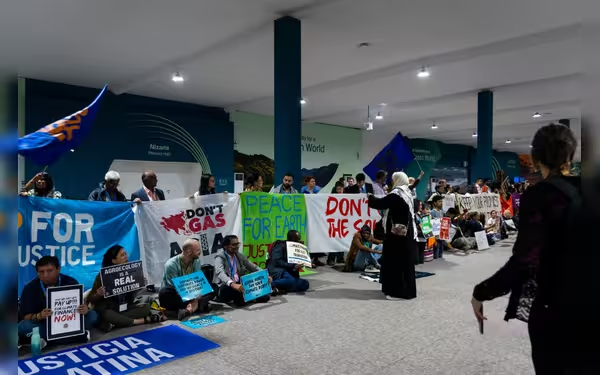Saturday, November 23, 2024 01:20 PM
COP29 Outcomes: Implications for Vulnerable Nations Facing Climate Change
- COP29 emphasizes urgent energy transition to combat climate change.
- Loss and damage funding crucial for vulnerable countries' adaptation.
- Wealthier nations urged to contribute $250 billion annually.
 Image Credits: arabnewspk
Image Credits: arabnewspkCOP29 highlights urgent need for energy transition and funding for vulnerable nations affected by climate change.
Climate change is one of the most pressing issues facing our planet today, affecting millions of lives and ecosystems across the globe. The recent 2024 United Nations Climate Change Conference, held in Baku, Azerbaijan, brought together leaders, activists, and researchers from around the world to discuss the urgent need for solutions to combat this crisis. With a focus on financing mechanisms, the conference aimed to support vulnerable nations, particularly developing countries that are most impacted by climate change.
This year’s conference, known as COP29, highlighted the critical need for an energy transition. Fossil fuel emissions are the primary cause of global warming, accounting for over 75 percent of greenhouse gas emissions. The UN has reported that burning coal, oil, and gas contributes to approximately 90 percent of all carbon dioxide emissions. Policymakers at COP29 emphasized that reducing reliance on traditional fuels and embracing modern energy solutions could significantly lower the global carbon footprint, helping the world move closer to net-zero targets.
Despite these discussions, the University of Exeter’s Global Carbon Budget has projected a rise in total CO2 emissions from 40.6 billion metric tons in 2023 to 41.6 billion in 2024. This alarming trend underscores the urgency of the situation. Climate activist Philip McMaster, also known as SustainaClaus, expressed his hope for a healthier environment for future generations. He stated, "The message of SustainaClaus is ‘Make childhood great again.’ Why? Because we all had a childhood before. It was either great or not, but it was a very important period of time, and that is what these negotiations should be about: how we make the world a better place for the next generations."
Another significant concern raised during the conference was the environmental impact of military activities. Olga Lermak, from Greencubator, highlighted the ecological devastation caused by war, stating, "War creates a climate crisis not just where it happens; it pollutes air, water, and land." The ongoing conflict in Ukraine has severely affected the country’s biodiversity, which is home to 35 percent of Europe’s species. Lermak hopes that the negotiations will lead to real solutions rather than mere discussions.
Loss and damage funding was also a key topic at COP29. This funding addresses the unavoidable damage caused by climate change, particularly in vulnerable countries. Researchers estimate that the loss and damage needs of these nations could reach between $130 billion and $940 billion by 2025. Gloria Bulus from Nigeria’s Bridge that Gap Initiative stressed the importance of moving beyond speeches to deliver concrete solutions. She expressed her desire for "fair" negotiations that prioritize action and renewable energy transitions.
In a promising development, COP29 proposed that wealthier countries contribute $250 billion annually to support developing nations in their climate change efforts. This commitment aims to secure the highest ambition outcome possible, ensuring that those most affected by climate change receive the necessary support to adapt and thrive.
As the world grapples with the realities of climate change, the outcomes of COP29 could have far-reaching implications for vulnerable nations. The discussions and commitments made during this conference are crucial steps toward a more sustainable future. It is essential for all countries to work together, not just in words but in actions, to combat climate change and protect our planet for generations to come. The time for decisive action is now, and the world is watching.













